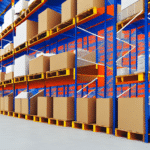Leading the Way in Ecommerce Fulfillment Logistics
In the rapidly evolving world of ecommerce, success hinges on delivering a seamless online shopping experience. A pivotal aspect of this experience is efficient and timely logistics, encompassing everything from inventory warehousing to shipping products directly to customers' doorsteps. Ecommerce fulfillment logistics, therefore, stands as a critical component in the foundation of a thriving ecommerce business.
Why Ecommerce Fulfillment Logistics is Crucial for Your Business
Ecommerce fulfillment logistics refers to the comprehensive process of receiving, processing, and delivering orders to customers. An optimized fulfillment process ensures that products are delivered on time, in excellent condition, and to the correct location, all while minimizing costs and elevating customer satisfaction.
Neglecting fulfillment logistics can lead to a host of negative outcomes, including lost sales from out-of-stock items, delayed deliveries, incorrect orders, damaged products, and increased customer churn due to poor service experiences.
Moreover, a well-managed ecommerce fulfillment system enables businesses to scale and expand operations efficiently. Streamlining the order fulfillment process allows businesses to handle a greater volume of orders without sacrificing quality or customer satisfaction, resulting in increased revenue, enhanced brand reputation, and a competitive market advantage.
The Importance of Streamlined Ecommerce Fulfillment Logistics
Streamlining ecommerce fulfillment logistics adds significant value by enhancing operational efficiency, reducing costs, and strengthening customer relationships. Optimizing order processing speed and accuracy enables retailers to fulfill orders more quickly, cut shipping expenses, and ultimately boost profit margins.
A streamlined fulfillment process also enhances the customer experience, leading to higher satisfaction and loyalty. Providing customers with accurate shipping information, tracking numbers, and timely updates fosters trust, improves brand reputation, and encourages repeat purchases.
Additionally, an efficient fulfillment process facilitates better scalability. As your business grows, a well-organized system can manage increased order volumes without compromising on quality or efficiency, helping to avoid costly errors and delays that could damage your business's reputation and profitability.
Furthermore, in a crowded ecommerce marketplace, offering fast and reliable shipping can attract and retain customers who prioritize convenience and efficiency. This differentiation helps your business stand out from competitors struggling with slow or unreliable order fulfillment.
How to Optimize Your Ecommerce Fulfillment Logistics for Maximum Efficiency
Optimizing ecommerce fulfillment logistics involves understanding your business requirements and implementing the right technologies and strategies to create a seamless process. Here are some effective methods:
- Automate Processes: Utilize order management and inventory management tools to eliminate manual efforts, ensuring real-time visibility of inventory levels and reducing the risk of overselling or stockouts.
- Leverage Predictive Analytics: Implement machine learning technologies to forecast demand patterns, optimize stock levels, and enhance order fulfillment accuracy.
- Adopt Integrated Systems: Ensure that your ecommerce platform integrates smoothly with your fulfillment systems to streamline operations and reduce errors.
- Enhance Warehouse Management: Optimize warehouse layout and processes to improve picking and packing efficiency.
According to the McKinsey Ecommerce Fulfillment Report 2023, businesses that invest in automation and predictive analytics see a significant increase in order accuracy and a reduction in fulfillment costs.
The Role of Technology in Modern Ecommerce Fulfillment Logistics
Technology is integral to modern ecommerce fulfillment logistics, offering tools that automate and optimize fulfillment processes to enhance efficiency and reduce costs. Key technologies include:
- Warehouse Management Systems (WMS): These systems streamline warehouse operations, improving inventory accuracy and order processing speed.
- Order Management Platforms: Centralize order processing, ensuring seamless integration between sales channels and fulfillment operations.
- Robotics: Automate warehouse tasks such as picking, packing, and sorting, significantly increasing operational efficiency.
- Artificial Intelligence (AI) and Machine Learning: Enable predictive analytics for demand forecasting, inventory optimization, and personalized customer experiences.
- Internet of Things (IoT): Enhance real-time tracking of inventory and shipments, providing greater visibility and control over the supply chain.
Emerging technologies like robotics and AI are revolutionizing ecommerce logistics, enabling faster and more accurate fulfillment processes. For example, Amazon's use of robotics in its fulfillment centers has drastically reduced processing times and increased order accuracy.
The Benefits of Outsourcing Your Ecommerce Fulfillment Logistics
Outsourcing ecommerce fulfillment logistics to a third-party logistics (3PL) provider offers several advantages:
- Resource Allocation: Frees up resources, allowing businesses to focus on core activities like marketing and product development.
- Scalability: 3PLs can scale operations based on business needs, accommodating fluctuations in order volume seamlessly.
- Expertise and Infrastructure: Benefit from the specialized knowledge and infrastructure that 3PL providers offer.
- Cost Efficiency: Reduce capital expenditures and operational costs by leveraging the economies of scale that 3PLs provide.
- Enhanced Customer Satisfaction: Access to real-time tracking information and faster delivery options improves the overall customer experience.
Choosing the right 3PL requires careful evaluation of factors such as costs, performance, expertise, and reputation. A study by Forbes indicates that businesses partnering with reputable 3PLs experience significant improvements in delivery speed and customer satisfaction rates.
What to Look for in an Ecommerce Fulfillment Logistics Provider
When selecting a fulfillment logistics provider, consider the following key factors to ensure a successful partnership:
- Experience and Expertise: Look for providers with a proven track record in handling ecommerce orders efficiently.
- Technological Capabilities: Ensure the provider utilizes advanced technologies that align with your business needs.
- Scalability: The ability to scale operations up or down based on demand fluctuations, seasonality, or product launches is crucial.
- Transparent Pricing and SLAs: Clear pricing structures and well-defined service-level agreements (SLAs) prevent unexpected costs and ensure reliability.
- Reputation: Research the provider’s reputation within the industry and among existing customers to gauge reliability and quality of service.
By thoroughly vetting potential providers based on these criteria, businesses can select a partner that aligns with their goals and enhances their ecommerce fulfillment logistics.
The Future of Ecommerce Fulfillment Logistics: Trends to Watch
The ecommerce landscape is continually evolving, and so are fulfillment logistics. Key trends shaping the future include:
- Increased Automation and Robotics: Continued adoption of robotics to accelerate warehouse operations and reduce human error.
- Advancements in Last-Mile Delivery: Innovations like drone deliveries and autonomous vehicles to enhance the speed and accuracy of local deliveries.
- Sustainability: Growing emphasis on environmentally-friendly practices, including sustainable packaging and carbon-neutral shipping options.
- AI and Machine Learning Integration: Enhanced demand forecasting, inventory management, and personalized customer experiences through advanced analytics.
- Omnichannel Fulfillment: Seamless integration of online and offline channels to provide a unified shopping experience.
Staying abreast of these trends allows businesses to adapt proactively, maintain a competitive edge, and meet the evolving demands of consumers. According to a recent Gartner report, businesses implementing these trends are projected to see significant improvements in fulfillment efficiency by 2025.
Case Study: How Amazon Improved Their Ecommerce Fulfillment Logistics
Amazon serves as a prime example of a company that has successfully optimized its ecommerce fulfillment logistics. By heavily investing in technologies such as robotics, predictive analytics, and machine learning, Amazon has significantly expedited its fulfillment processes and reduced delivery times.
The introduction of Amazon Prime revolutionized customer expectations with features like same-day, one-day, and two-day shipping options. Additionally, Amazon's extensive network of fulfillment centers and partnerships with third-party logistics providers enable quick and efficient order fulfillment on a global scale.
These strategic investments have not only enhanced operational efficiency but also solidified Amazon's reputation for reliable and fast delivery, contributing to its dominant position in the ecommerce market.
Best Practices for Managing Your Ecommerce Fulfillment Logistics
To optimize ecommerce fulfillment logistics, businesses should adopt the following best practices:
- Invest in the Right Technologies: Utilize automation and integrated systems to streamline processes and reduce manual errors.
- Ensure Real-Time Inventory Visibility: Maintain accurate, real-time tracking of inventory levels to prevent stockouts and overstocking.
- Identify and Mitigate Risks: Proactively address potential risks in the supply chain, such as supplier disruptions or logistics delays.
- Implement Accurate Demand Forecasting: Use data analytics to predict demand trends and optimize inventory and fulfillment strategies accordingly.
- Communicate Proactively with Customers: Keep customers informed about shipping and delivery statuses through regular updates and tracking information.
Adhering to these best practices ensures high levels of customer satisfaction, operational efficiency, and overall profitability in ecommerce fulfillment logistics.
Common Challenges in Ecommerce Fulfillment Logistics and How to Overcome Them
Optimizing ecommerce fulfillment logistics comes with its set of challenges. Common issues include:
- Out-of-Stock Products: Leads to lost sales and customer dissatisfaction.
- Inaccurate Product Descriptions: Results in incorrect orders and returns.
- Logistics and Technology Breakdowns: Causes delayed deliveries and damaged products.
To overcome these challenges, businesses can:
- Enhance Inventory Management: Implement robust inventory tracking systems to maintain stock accuracy.
- Improve Product Information: Ensure accurate and detailed product descriptions to minimize order errors.
- Invest in Reliable Technology: Utilize dependable logistics and fulfillment technologies to prevent disruptions.
- Maintain Proactive Communication: Keep customers informed about any issues or delays to maintain trust.
- Conduct Regular Monitoring and Quality Control: Continuously oversee fulfillment processes to identify and address potential problems promptly.
By addressing these challenges proactively, businesses can maintain efficient fulfillment operations and uphold high customer satisfaction levels.
Key Metrics to Measure the Success of Your Ecommerce Fulfillment Logistics
Evaluating the success of ecommerce fulfillment logistics involves tracking key performance metrics that provide insights into process effectiveness and efficiency. Important metrics include:
- Order Accuracy Rate: The percentage of orders fulfilled correctly without errors.
- Order Processing Time: The average time taken to process and fulfill an order from placement to shipment.
- Inventory Turnover Rate: Measures how often inventory is sold and replaced over a specific period.
- Shipping and Delivery Time: The duration between order shipment and its delivery to the customer.
- Customer Satisfaction Rate: Assessed through customer feedback, reviews, and repeat purchase rates.
Consistently monitoring and analyzing these metrics enables businesses to identify areas for improvement, optimize their fulfillment processes, and enhance overall operational performance. Tools like fulfillment analytics platforms can assist in tracking these metrics effectively.
The Impact of Covid-19 on Ecommerce Fulfillment Logistics
The Covid-19 pandemic significantly altered consumer behavior, leading to a surge in online shopping. This unexpected boom placed immense pressure on supply chains and logistics providers, causing delays and disruptions in fulfillment operations.
However, the pandemic underscored the critical importance of robust ecommerce fulfillment logistics and the ability of businesses to adapt swiftly. Many businesses adopted new technologies and strategies to meet the unprecedented demand, such as:
- Curbside Pickup: Offered customers a contactless option to collect orders.
- Contactless Delivery: Ensured the safe delivery of products without direct contact.
- In-Store Fulfillment: Leveraged physical store locations to fulfill online orders more efficiently.
These innovations not only helped businesses navigate the challenges posed by the pandemic but also set new standards for customer service and fulfillment efficiency. According to a post-pandemic fulfillment survey by Forbes, 60% of businesses that implemented these strategies reported sustained improvements in fulfillment operations post-Covid-19.
Expert Insights: Q&A with Industry Leaders on Ecommerce Fulfillment Logistics
To gain deeper insights into ecommerce fulfillment logistics, we consulted several industry leaders to understand the current landscape, emerging trends, and best practices.
Amit Sharma, CEO of Narvar, stated, "Building a scalable and resilient ecommerce fulfillment operation requires a combination of cutting-edge technology, data analytics, and a customer-centric culture." Sharma emphasized the importance of adopting innovative technologies and software to stay competitive in the market.
Darren Cox, Managing Director of UK Fulfilment, highlighted the significance of flexibility and responsiveness in managing ecommerce fulfillment. "Successful ecommerce fulfillment logistics requires a willingness to adapt," he noted, pointing out that adaptability is key to overcoming unexpected challenges and meeting dynamic customer needs.
These expert perspectives underscore the necessity of embracing technology and maintaining adaptability to excel in ecommerce fulfillment logistics.
How to Implement Sustainable Practices in Your Ecommerce Fulfillment Logistics
With sustainability becoming an increasingly important issue, businesses are integrating eco-friendly strategies into their logistics operations. Implementing sustainable practices in ecommerce fulfillment logistics can not only reduce environmental impact but also attract environmentally-conscious consumers. Here are some effective strategies:
- Reduce Packaging Waste: Utilize eco-friendly materials and recycling programs to minimize packaging waste.
- Energy-Efficient Systems: Invest in energy-efficient lighting, heating, and cooling systems within fulfillment centers.
- Optimize Transportation: Develop transportation strategies that reduce carbon emissions, such as consolidating shipments and using electric vehicles.
- Collaborate with Sustainable Partners: Work with logistics partners who prioritize sustainable practices across the supply chain.
- Implement Green Warehousing: Incorporate sustainable design and operations in warehouses, such as using renewable energy sources and optimizing space utilization.
According to the Sustainable Brands Report 2023, businesses that adopt sustainable fulfillment practices can reduce their carbon footprint by up to 30% while simultaneously increasing customer loyalty among eco-conscious consumers.
Conclusion
Ecommerce fulfillment logistics is an essential component of a successful online business. By investing in advanced technologies, partnering with reliable 3PL providers, and adopting best practices, businesses can create a seamless, efficient, and cost-effective fulfillment process. This not only enhances profitability but also elevates customer satisfaction. Staying attuned to emerging trends and maintaining flexibility ensures that businesses remain competitive and resilient in the ever-changing ecommerce landscape.




















